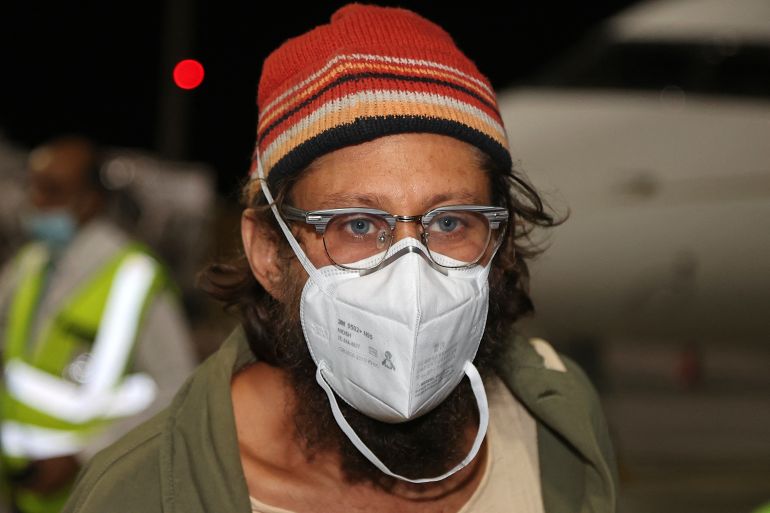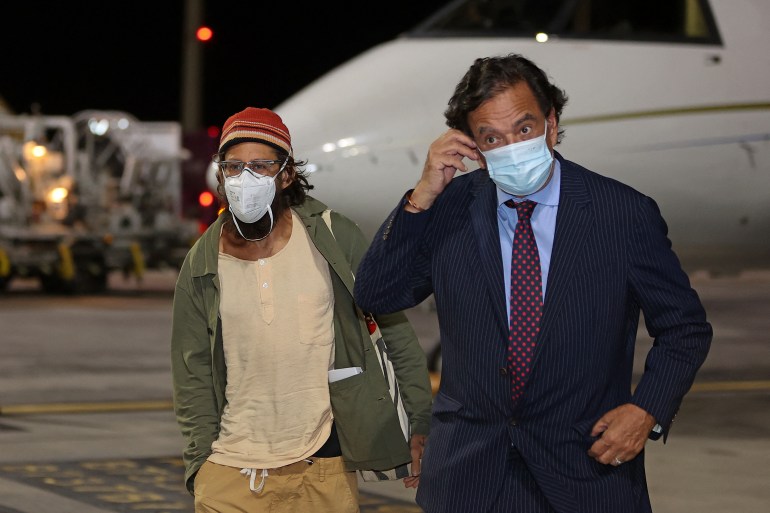US journalist Danny Fenster on way home after Myanmar release
Fenster says he will continue to highlight the plight of detained colleagues in the country, most of whom are Myanmar citizens.

Doha, Qatar – American journalist Danny Fenster was on his way home on Monday, hours after being released from six months’ imprisonment in Myanmar, where he was sentenced last week to 11 more years behind bars.
Fenster, wearing a knit cap, a shaggy beard and sandals, said he felt “great” after landing in Doha, Qatar on a chartered flight, just three days after being handed the sentence. He had been convicted on charges of spreading false or inflammatory information, contacting illegal organisations and violating visa regulations.
Keep reading
list of 4 itemsMyanmar charges US journalist with ‘terrorism’, sedition
US journalist Danny Fenster jailed for 11 years in Myanmar
US journalist Danny Fenster released from Myanmar prison
“I’m just really happy to be on my way home,” he told reporters in Doha, accompanied by former United States ambassador to the United Nations Bill Richardson, who had negotiated his release.
Fenster, who was working as the managing editor of Myanmar Frontier, a local online magazine, had been arrested in May as he tried to board a flight from Yangon to the US city of Detroit.
The arrest came amid a crackdown by Myanmar’s military, which seized control of the country in February, prompting mass protests and civil disobedience. To date, at least 1,265 people have been killed in the country and more than 10,000 have been detained, according to the Assistance Association for Political Prisoners, which has been monitoring the situation.

Rights groups say dozens of local journalists remain in detention, as do medical workers, activists and political opponents of the military rulers. The UN’s Independent Investigative Mechanism for Myanmar has said evidence shows the military has committed “crimes against humanity”.
Amid the crackdown, the military has imposed internet blackouts, shut down satellite television and revoked the publishing licences of a number of independent Myanmar news organisations.
It had accused Fenster of working for Myanmar Now, which was among the news organisations that had had their licences revoked.
However, Fenster had left the website in June of 2020 to work for Frontier Myanmar. The magazine, which hailed Fenster’s release, said the court had ignored key evidence, including tax records, that confirmed Fenster was no longer working for Myanmar Now.
His 11-year sentence was the harshest punishment yet among the seven journalists known to have been convicted since the military seized power and detained elected leader Aung San Suu Kyi.
Fenster was also charged with sedition and “terrorism”, although a new trial on those allegations had not begun.
On Monday, Fenster said he would work to continue to highlight the plight of detained colleagues in the country, the vast majority of which are Myanmar citizens.
“We’re gonna keep the focus on them as much as possible and do everything we can to lobby on their behalf,” he said. “We’re still trying really hard and hoping we can get them out of there.”
Former diplomat Richardson told reporters he was able to negotiate Fenster’s release during a recent visit to Myanmar when he held face-to-face meetings with ruling Senior General Min Aung Hlaing. The trip, which was billed as a private humanitarian mission, had been criticised by some as legitimising the military takeover.
However, in Doha on Monday night, Richardson, who also served as governor of New Mexico and as US secretary of energy, attributed the military’s abrupt about-face to his “efforts to work with the government of Myanmar on humanitarian assistance, on vaccines”.
He also thanked the government of Qatar, which he said supports his foundation, the Richardson Center, in its work to “release hostages, both American and non-American”.
In a statement on Monday, US Secretary of State Antony Blinken also welcomed Fenster’s release.
“We continue to call for the release of others who remain unjustly imprisoned in Burma,” he said, referring to Myanmar by its former name.
Fenster’s family, meanwhile, said in a statement they were “overjoyed that Danny has been released and is on his way home – we cannot wait to hold him in our arms”.
Speaking in Qatar, Fenster said he had not been “starved or beaten” while being held in the infamous Insein prison near Yangon, saying his biggest concern was just “staying sane through that”.
“I was arrested and held in captivity for no reason,” he added. “So I suppose I was (mistreated), but physically I was healthy.”